Even on his death bed with an oxygen mask over his face, Gerry Conlon – one of the Guildford Four – was still talking about current miscarriages of justice and the prisoners held at Guantánamo Bay, mourners at his funeral have heard.
Gareth Peirce, the solicitor who helped free Conlon as well as the Birmingham Six, said Conlon continued "talking and talking" in his last few days alive in Belfast's Royal Victoria hospital, imploring those around him to continue to fight for those wrongly imprisoned in Ireland, the UK and across the world.
Peirce gave a moving eulogy at the end of requiem mass in Conlon's home parish of St Peter's in Belfast's Lower Falls district on Saturday. She told mourners: "Struggling for oxygen, with a mask most of the time clamped to his face, he was just talking and talking and talking about the things that needed to be done, the people who were wrongly imprisoned here and in Guantánamo, in Australia, he couldn't stop talking."
Peirce said the injustice inflicted on Conlon and the three other young people, who became known as the Guildford Four, was not the actions simply of one or two rogue police officers but rather British state policy at the time.
Gerry Conlon, Paddy Armstrong, Paul Hill and Carole Richardson were jailed for life in 1975 for an attack on the Horse and Groom pub in Guildford which killed four soldiers and a civilian, as well as injuring scores more. All four of them involved protested their innocence.
The court of appeal in London quashed their sentences in October 1989, amid doubts raised about the police evidence against them.
But Conlon had already witnessed his father Giuseppe die in jail after he was also arrested just months after the Guildford bombing along with his sister-in-law Annie, four members of her family, and a family friend at their home in London. Police investigating the Guildford case accused the Maguire Seven of running an IRA bomb-making factory in north London. Their convictions were finally overturned in 1991.
Referring to a series of false convictions against Irish people in Britain during the IRA's bombing campaigns, Pierce told the congregation inside St Peter's Cathedral: "When he (Conlon) angrily, angrily stated the truth it had an extraordinary effect and made the world understand that innocent men and women had been buried alive in English prisons year after year, and it had been allowed and indeed it had been organised to happen. It was no accident. So when he shouted out 'I am an innocent man,' that his father was innocent, that the Maguires were innocent, and the Birmingham Six were innocent he said something emotional that forced the rest of us, the rest of the world, to hold a mirror up to ourselves and what we had done."
Among those who carried his coffin into St Peter's was Paddy Hill, one of the Birmingham Six whom Conlon swore on the day of his release that he would help free from prison. All six Irishmen were freed two years after Conlon's conviction was quashed. Brian Shivers, the man freed after being wrongly convicted of shooting dead two soldiers at a barracks in Antrim Town in 2009 also carried Conlon's coffin.
Mourners inside the church included the Irish foreign minister and deputy prime minister Eamon Gilmore, the Sinn Féin west Belfast MP Paul Maskey and his brother, one-time lord mayor of Belfast Alex Maskey, members of every republican faction to emerge during the Troubles as well as family and friends from the Lower Falls area where he grew up.
The 60-year-old died from lung cancer last weekend only learning that he was terminally-ill a month ago when he went into hospital believing he was suffering from pneumonia.
Just before Gareth Peirce's tribute, a member of the English rock and blues band "The Alabama 3" in the church played an acoustic version of "May the Circle Be Unbroken" in honour of Conlon who was a long time friend of the group.
After mass, his coffin was carried onto Albert Street where his mother Sarah had lived during the 15 years her son had spent in prison. On the wall of Sarah Conlon's house hung a framed copy of a newspaper printed a few days after his release in 1989. Its headline quoted the concluding remarks of the trial judge back when Conlon was convicted in 1975, with Mr Justice Donaldson noting: "If hanging were still an option you would have been executed."
Gerry Conlon was laid to rest in Milltown cemetery after his coffin was carried along the Falls Road. No one has ever been convicted of the Guildford pub bombings.



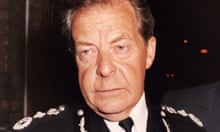
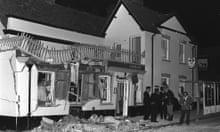
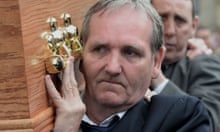
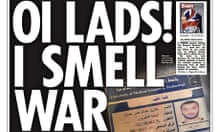
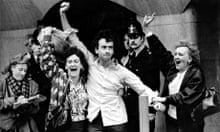
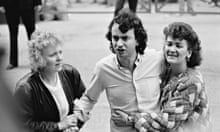
Comments (…)
Sign in or create your Guardian account to join the discussion